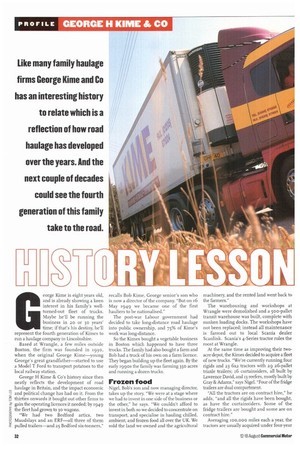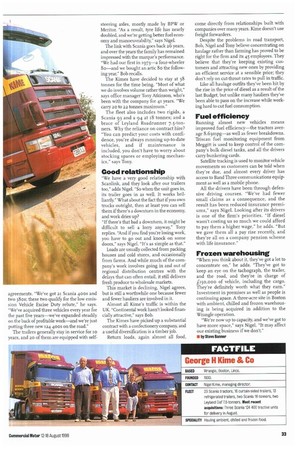Like many family haulage firms George Kime and Co has
Page 34

Page 35

If you've noticed an error in this article please click here to report it so we can fix it.
an interesting history to relate which is a reflection of how road haulage has developed over the years. And the next couple of decades could see the fourth generation of this family take to the road.
George Kime is eight years old, and is already showing a keen interest in his family's wellturned-out fleet of trucks. Maybe he'll be running the business in zo or 30 years' time; if that's his destiny, he'll represent the fourth generation of Kimes to run a haulage company in Lincolnshire.
Based at Wrangle, a few miles outside Boston, the firm was founded in 1930, when the original George Kime—young George's great grandfather—started to use a Model T Ford to transport potatoes to the local railway station.
George H Kime 8c Co's history since then neatly reflects the development of road haulage in Britain, and the impact economic and political change has had on it. From the thirties onwards it bought out other firms to gain the operating licences it needed; by 1949 the fleet had grown to 30 wagons.
"We had two Bedford artics, two Maudslays and an ERF—all three of them pulled trailers—and 25 Bedford six-tonners," recalls Bob Kime, George senior's son who is now a director of the company. "But on 16 May 1949 we became one of the first hauliers to be nationalised."
The post-war Labour government had decided to take long-distance road haulage into public ownership, and 75% of Kime's work was long-distance.
So the Kimes bought a vegetable business in Boston which happened to have three trucks. The family had also bought a farm and Bob had a truck of his own on a farm licence. They began building up the fleet again. By the early 19905 the family was farming 350 acres and running a dozen trucks.
Frozen food
Nigel, Bob's son and now managing director, takes up the story. "We were at a stage where we had to invest in one side of the business or the other," he says. "We couldn't afford to invest in both so we decided to concentrate on transport, and specialise in hauling chilled, ambient, and frozen food all over the UK. We sold the land we owned and the agricultural machinery, and the rented land went back to the farmers."
The warehousing and workshops at Wrangle were demolished and a 5c)c)-pallet transit warehouse was built, complete with sunken loading docks. The workshops have not been replaced; instead all maintenance is farmed out to local Scania dealer Scanlink. Scania's 4-Series tractor rules the roost at Wrangle.
At the same time as improving their twoacre depot, the Kimes decided to acquire a fleet of new trucks. "We're currently running four rigicls and 23 6x2 tractors with 29 26-pallet triaxle trailers; 16 curtainsiders, all built by Lawrence David, and 13 reefers, mostly built by Gray 8c Adams," says Nigel. "Four of the fridge trailers are dual compartment.
All the tractors are on contract hire," he adds, "and all the rigids have been bought, as have the curtainsiders. Some of the fridge trailers are bought and some are on contract hire."
Averaging 100,000 miles each a year, the tractors are usually acquired under four-year agreements. "We've got 21 Scania 400s and two 38os; these two qualify for the low emission Vehide Excise Duty rebate," he says. "We've acquired three vehicles every year for the past five years—we've expanded steadily on the back of profitable work—and we're just putting three new 124 4005 on the road."
The trailers generally stay in service for io years, and 20 of them are equipped with self
steering axles, mostly made by BPW or Mentor. "As a result, tyre life has nearly doubled, and we're getting better fuel economy and manoeuvrability," says Nigel.
The link with Scania goes back 26 years, and over the years the family has remained impressed with the marque's performance. "We had our first in 1973—a four-wheeler 8o—and we bought an artic 8o the following year," Bob recalls.
The Kimes have decided to stay at 38 tonnes for the time being. "Most of what we do involves volume rather than weight," says office manager Tony Atkinson, who's been with the company for 41 years. "We carry 20 to 22 tonnes maximum."
The fleet also includes two rigids, a Scania 93 and a 94 at 18 tonnes; and a brace of Leyland Roadrunner 7.5-tonners. Why the reliance on contract hire? "You can predict your costs with confidence, you're always running up-to-date vehicles, and if maintenance is included, you don't have to worry about stocking spares or employing mechanics," says Tony.
Good relationship
"We have a very good relationship with Scanlink, and they look after our trailers too," adds Nigel. "So when the unit goes in, its trailer goes in as well. It works brilliantly." What about the fact that if you own trucks outright, then at least you can sell them if there's a downturn in the economy, and work dries up?
"If there's that bad a downturn, it might be difficult to sell a lorry anyway," Tony replies. "And if you find you're losing work, you have to go out and knock on some doors," says Nigel. "It's as simple as that."
Loads are usually collected from packing houses and cold stores, and occasionally from farms. And while much of the company's work involves going in and out of regional distribution centres with the delays that can often entail, it still delivers fresh produce to wholesale markets.
This market is declining, Nigel agrees, but is still a worthwhile one because fewer and fewer hauliers are involved in it.
Almost all Kime's traffic is within the UK. "Continental work hasn't looked financially attractive," says Bob.
The Kimes have picked up a substantial contract with a confectionery company, and a useful diversification is a timber job.
Return loads, again almost all food, come directly from relationships built with companies over many years. Kime doesn't use freight forwarders.
Despite the problems in road transport, Bob, Nigel and Tony believe concentrating on haulage rather than farming has proved to be right for the firm and its 45 employees. They believe that they're keeping existing customers and attracting new ones by providing an efficient service at a sensible price; they don't rely on cut-throat rates to pull in traffic.
Like all haulage outfits they've been hit by the rise in the price of diesel as a result of the last Budget, but unlike many hauliers they've been able to pass on the increase while working hard to cut fuel consumption.
Fuel efficiency
Running almost new vehicles means improved fuel efficiency—the tractors average 8.63mpg—as well as fewer breakdowns. Triscan fuel monitoring equipment from Meggitt is used to keep control of the company's bulk diesel tanks, and all the drivers carry bunkering cards.
Satellite tracking is used to monitor vehicle movements so customers can be told when they're due, and almost every driver has access to Band Three communications equipment as well as a mobile phone.
All the drivers have been through defensive driving courses. "We've had fewer small claims as a consequence, and the result has been reduced insurance premiums," says Nigel. Looking after its drivers is one of the firm's priorities. "If diesel wasn't costing us so much we could afford to pay them a higher wage," he adds. "But we gave them all a pay rise recently, and they're all on a company pension scheme with life insurance."
Frozen warehousing
"When you think about it, they've got a lot to concentrate on," he adds. "They've got to keep an eye on the tachograph, the trailer, and the road, and they're in charge of i150,000 of vehicle, including the cargo. They're definitely worth what they earn." Investment in premises as well as people is continuing apace. A three-acre site in Boston with ambient, chilled and frozen warehousing is being acquired in addition to the Wrangle operation.
"We're now up to capacity, and we've got to have more space," says Nigel. "It may affect our existing business if we don't."








































































































